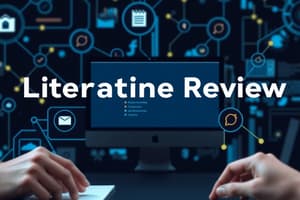Podcast
Questions and Answers
What is the primary function of Scholarcy?
What is the primary function of Scholarcy?
- To paraphrase and rewrite sentences and articles
- To provide grammar and spelling corrections
- To create citation-based maps for research
- To summarize key points and claims of articles (correct)
Which tool helps researchers find similar papers and other researchers in their field?
Which tool helps researchers find similar papers and other researchers in their field?
- QuillBot
- Google Scholar
- Semantic Scholar
- Research Rabbit (correct)
What is the primary benefit of using QuillBot?
What is the primary benefit of using QuillBot?
- Enhancing grammar and spelling corrections
- Enhancing research paper discovery
- Improving research citation management
- Reducing writing time by more than half (correct)
What is the primary function of Google Scholar?
What is the primary function of Google Scholar?
What is the primary function of Semantic Scholar?
What is the primary function of Semantic Scholar?
Which tool is primarily used for grammar and spelling corrections?
Which tool is primarily used for grammar and spelling corrections?
What is the primary function of AI research tools?
What is the primary function of AI research tools?
What is one of the challenges of using AI in content research?
What is one of the challenges of using AI in content research?
How can AI improve information retrieval?
How can AI improve information retrieval?
What is one way AI can assist in research tasks?
What is one way AI can assist in research tasks?
In what phase of research can ChatGPT be particularly useful?
In what phase of research can ChatGPT be particularly useful?
What is one benefit of using AI-powered tools in research?
What is one benefit of using AI-powered tools in research?
Flashcards are hidden until you start studying
Study Notes
AI Research Tools
- AI tools are software applications that use artificial intelligence algorithms to perform specific tasks and solve problems.
- AI tools can be used in various industries, including healthcare, finance, marketing, and education, to automate tasks, analyze data, and improve decision-making.
AI Role in Assisting Research Tasks
- AI-powered tools can automate data mining and analysis, streamline manual research processes, and improve the accuracy and speed of research.
- However, there are challenges and limitations to using AI in content research, including concerns around ethics and bias.
AI-Assisted Research Tasks
- AI can improve information retrieval by using automated, data-driven techniques to analyze and categorize large amounts of data.
- AI can automate information retrieval tasks, reducing the burden on analysts and allowing them to focus on analysis.
- AI can also help with data analysis, citation management, and other research tasks.
Popular AI Research Tools
- ChatGPT: can be used in the initial idea development phase of research, and can also be used to find further sources.
- Scholarcy: summarizes key points and claims of articles into 'summary cards' that researchers can read, share, and annotate.
- Research Rabbit: a citation-based mapping tool that focuses on the relationships between research works, using visualizations to help researchers find similar papers and other researchers in their field.
- Grammarly: a tool for grammar and spelling to style and tone, making it easy to eliminate errors and find the perfect words to express oneself.
- QuillBot: a paraphrasing and summarizing tool that helps users cut their writing time by more than half using state-of-the-art AI.
- Google Scholar: a tool that allows scholars to easily stay up-to-date on the latest research papers, scholarly literature, articles, conference papers, and theses.
- Semantic Scholar: a free, AI-powered research and discovery tool for navigating the ever-growing literature in all scientific domains, helping researchers discover and understand scientific literature that's most relevant to their work.
Studying That Suits You
Use AI to generate personalized quizzes and flashcards to suit your learning preferences.




